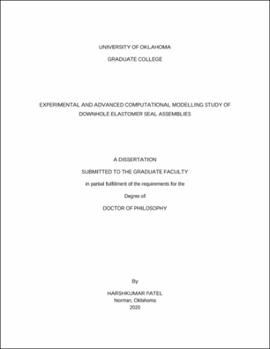| dc.description.abstract | Elastomers seals are widely used in various drilling, completion, and production equipment. One such equipment is liner hanger which has become integral part of modern well designs. Failure of liner hanger seal assembly can compromise well integrity, and lead to severe health, safety, and environmental consequences. Concerns regarding reliability of elastomer seals in liner hanger assemblies have been raised by the regulators as well as industry.
This dissertation work provides detailed investigation of design, and failure of downhole elastomer seal assemblies using experimentally supported advanced computational modeling techniques. This work is partially supported by Bureau of Safety and Environmental Enforcement (BSEE) and it is set in the context of liner hanger assemblies. However, major outcomes of this research also applies to other downhole seal assemblies. Specific objectives of this dissertation are - (i) investigate performance of liner hanger seal assembly under various design, operational, and failure scenarios, (ii) develop operating envelops and identify critical parameters influencing performance of the elastomer seal assembly, (iii) develop a modelling tool for predicting leakage through elastomer seal interface considering surface characteristics, (iv) generate guidelines for design and qualification of elastomer seals and provide regulatory recommendations.
Novel technical aspects of this research work are – (i) studying material behavior of different elastomer material (NBR, EPDM, FKM, FEPM, FFKM, PTFE) under normal and downhole conditions, (ii) using the elastomer material data in true-scale finite element (FEA) models to evaluate equipment level performance of seal, (iii) scaled laboratory tests and analytical calculations to validate FEA models, and (iv) development of a leakage modelling tool that can predict leakage rates as a function of surface topography of seal interface and operating conditions.
Results from this dissertation indicate that type and design of seal equipment determines which elastomer properties need to be qualified. Hardness and elastic modulus alone may not be good predictors of fitness-for-service of seal assembly. For example, performance of expandable liner hanger seal assembly primarily depends on seal dimensions and elastomer shear modulus while performance of conventional liner hanger seal assembly mainly depends on elastomer bulk modulus. Selection of appropriate elastomer material for a certain application depends not only on chemical environment and temperature but also on assembly design, operational constraints, and thermal changes. Comparative evaluation demonstrated that conventional liner hanger seal assembly outperforms expandable liner hanger seal assembly in terms of contact pressure generated per unit energization but it is more prone to failure than expandable assembly.
Contact pressure at seal-pipe interface, as predicted by macro-scale FEA models, does not accurately indicate fluid pressure that can be effectively sealed. Leakage modelling studies demonstrated that surface characteristics of elastomer and fluid properties determines the contact pressure needed to achieve complete sealability. Leakage modelling approach developed in this work can be an invaluable tool in seal design workflow for determining target seal energization needed for complete sealability. | en_US |
